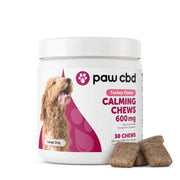Veterinarians are significantly limited by law in their ability to recommend CBD. While CBD for pets is widely accepted as a useful, safe tool for our dogs and cats, it is also relatively new, and studies are ongoing about the benefits and side effects of this wellness resource.
Veterinarians and CBD for pets is a complicated subject. Like any medical professional, your pet’s veterinarian is limited by some rules and regulations about what they can and cannot do or say – regardless of their personal feelings. The complicated regulatory world around CBD for pets can make it difficult to get the answers you want from your veterinarian about this wellness resource. If you’re trying to get a better understanding of how CBD can support your animal, and your veterinarian seems reluctant or unable to discuss it with you, here’s what you need to know.
Why Your Veterinarian Might Not Want to Discuss CBD for Pets
Veterinarians are limited in the ways they can discuss CBD for pets. This is because:
- The 2018 Farm Bill didn’t specifically address veterinarians and their patients
- State-specific regulations vary
- Clinical research about CBD for pets is ongoing
- The ramifications for discussing CBD for pets can be serious
The 2018 Farm Bill Doesn’t Mention Veterinarians and Pet CBD
The 2018 Farm Bill was revolutionary for the hemp-derived CBD industry because it removed hemp from the list of Controlled Substances. This allowed for more freedom in the production of hemp-derived CBD products, but the legislation provided no guidance about such products in a medical scenario, much less any mention of veterinarians and CBD for pets. This legal and regulatory vagueness is part of the reason veterinarians may be reluctant to discuss CBD for pets with you.
There Are Some State-Specific Regulations About What Veterinarians Can Say
As with so many vague federal regulations, the states have taken matters into their own hands. Depending on where you live, there may or may not be distinct rules about how much your veterinarian can discuss CBD for pets with you. These rules range from highly restrictive – any veterinarian who even discusses CBD can be penalized for doing so – to more relaxed.
A bill in California, for example, carefully outlines the legality of how veterinarians can talk to cat and dog owners about CBD. Specifically, the bill allows veterinarians to talk about cannabis for medicinal use, but not to recommend or prescribe such cannabis-derived wellness resources. Even though they are not the same, the bill does not differentiate between marijuana and hemp – it groups all products into the category of cannabis.
Veterinary boards in some states have weighed in on the subject. The Oregon Veterinary Medical Examining Board allows that “veterinarians can discuss the use of cannabis with clients,” and the Colorado Veterinary Medical Association says that it “recognizes … the potential benefits of marijuana therapies for a variety of animal medical conditions.” As you can see from this language, the issue of discussing CBD for pets with pet owners remains vague and somewhat risky for many veterinarians, even in states with more specific guidelines.
Some Veterinarians Are Waiting for More Clinical Studies to Be Released

While there is an abundance of anecdotal evidence about how pet CBD oil can benefit dogs and cats, there are few completed scientific studies about these benefits. Clinical research takes time, and some veterinarians might be reluctant to discuss CBD simply because they are waiting for more concrete research to be completed. Several studies are ongoing – including one at Colorado State University about the impact of cannabidiol on dogs with epilepsy.
Veterinarians Can Suffer Serious Consequences If They Break the Rules
Veterinarians are licensed in each state by a medical board. They are required to hold up various standards to maintain their license and stay in practice. If they choose to discuss CBD with a patient – or, moreover, recommend CBD as a wellness resource for an animal – they could suffer disciplinary action and may even have their license suspended or revoked. Veterinarians have to take their responsibilities seriously in order to stay in business and maintain high-quality care for their animal patients.
It’s Still Important to Discuss CBD with Your Veterinarian
Even though there are many limitations around what your veterinarian can say to you about CBD for pets, it’s still crucial to initiate that conversation with your dog or cat’s doctor. Veterinarians have important medical knowledge about your pet, including their medical history, and they also have the education and experience to know the significance of that medical history and how it impacts your pet.
Because our pets can’t talk to us, we have to rely on the physical and behavioral signals they provide to tell us about their health – and no one is better than veterinarians at interpreting those signals. Furthermore, your veterinarian can tell you if CBD will interact with any other drugs or medications your pet might be on.
Talk to Your Veterinarian About CBD for Pets
If you want to learn about this CBD for dogs or cats, or begin using it with your pet, it’s important to include your veterinarian in that decision-making process. Do some research on CBD for pets before this conversation. While your individual research is not a substitute for your veterinarian’s vital input, it will allow you to ask specific questions, such as “What can you tell me about CBD for pets?” or “How does CBD work in my pet’s body?”
When talking to your veterinarian about pet CBD, don’t use brand names for specific CBD products. They aren’t allowed to recommend or advise on specific products, so keep the conversation as general as you can. If you’re considering a product that includes any ingredients besides CBD that you’re concerned about, share that information with your veterinarian, as they can speak to those additional ingredients.
Take notes during the conversation so you remember what your veterinarian said, and don’t be afraid to consider a second opinion. You are entitled to information about this wellness resource and it’s okay to look around. Some veterinarians might be more willing to discuss the topic than others. It might also be worth calling clinics outside of your state and seeing if you can get a veterinarian to talk to you about CBD for pets on the phone.
CBD for Pets Should Be Ongoing Conversation with Your Veterinarian
Because the landscape is changing so rapidly, you shouldn’t hesitate to bring up CBD at a later date with your veterinarian after your initial conversation. Even if your pet’s doctor is reluctant to discuss this wellness resource, make it clear when you plan to give it to your pet and provide them with details about your pet’s CBD routine once you’ve established it.
Most veterinarians will not be willing to recommend CBD for pets right now, even if they think it’s an excellent wellness resource – but they might change their mind in the near future. New clinical research is coming forth constantly, which then transforms the rules around what veterinarians are allowed to say and what they feel comfortable discussing with you. Continue talking to your veterinarian about CBD for pets to be sure you’re updated on the most recent information and empowered to provide the best care for your animal.


